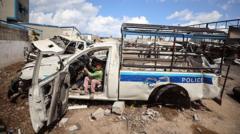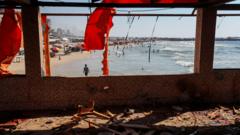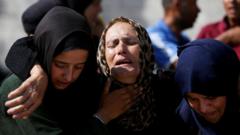In a stark revelation, a Hamas security officer disclosed to the BBC that the group has reportedly lost about 80% of its control in Gaza, with armed clans filling the power vacuum. The officer detailed the internal collapse of Hamas's command structure due to continuous Israeli military strikes, with local gangs now posing significant threats amidst the chaos.
Collapse of Hamas Authority as Armed Clans Rise in Gaza

Collapse of Hamas Authority as Armed Clans Rise in Gaza
A senior officer in Hamas reveals that the group has lost significant control over Gaza, allowing armed clans to emerge amid ongoing Israeli attacks.
In an exclusive interview with the BBC, a senior Hamas security officer anonymously outlined the dramatic loss of the group’s authority in Gaza. The officer stated that the Palestinian militant group's control has fallen to approximately 20% since the onset of severe Israeli military strikes, which he claims have decimated its political and military leadership.
The officer expressed concerns about the internal disintegration of the organization, noting that most of its leadership has been killed and that the remaining members are navigating a completely collapsed security structure. "Let's be realistic here - there's barely anything left of the security structure," he lamented, outlining the overwhelming lack of control over crime and disorder in the region.
Israeli airstrikes have particularly targeted Hamas’s command centers, leading to a chaotic environment where accountability and safety have evaporated. The officer recalled that even during a temporary ceasefire, Hamas attempted to reorganize, but this effort proved futile after the suspension of hostilities. "The security situation is zero. Hamas's control is zero," he said, illustrating the dire circumstances in which many residents struggle to survive.
Reports indicate a series of looting incidents in Gaza, where even assets belonging to Hamas’s security forces have been seized without intervention. The ongoing power vacuum has seen the emergence of armed clans that operate with impunity, raising fears of escalating violence. The officer described some of these gangs as capable of stopping citizens at will, leading to a situation where mere attempts to resist were met with swift Israeli bombardments.
Among the factions vying for control is a group led by Yasser Abu Shabab, who has allegedly established connections with external entities and appears to be gaining traction against Hamas. This has alarmed the Islamist group, which reportedly sees Abu Shabab as a potential unifying figure for their adversaries.
The rising danger within Gaza is compounded by the lack of resources and delayed salaries for Hamas members, contributing to the internal strife. As armed groups proliferate and chaos reigns, the officer warned that if someone like Abu Shabab manages to consolidate power, it could spell disaster for Hamas.
He concluded ominously, "For 17 years, Hamas made enemies everywhere. If someone like Abu Shabab can rally those forces, that could be the beginning of the end for us." As the situation in Gaza continues to deteriorate under both internal and external pressures, the once-dominant authority of Hamas is increasingly jeopardized, leading to a profound transformation of the region's power dynamics.
The officer expressed concerns about the internal disintegration of the organization, noting that most of its leadership has been killed and that the remaining members are navigating a completely collapsed security structure. "Let's be realistic here - there's barely anything left of the security structure," he lamented, outlining the overwhelming lack of control over crime and disorder in the region.
Israeli airstrikes have particularly targeted Hamas’s command centers, leading to a chaotic environment where accountability and safety have evaporated. The officer recalled that even during a temporary ceasefire, Hamas attempted to reorganize, but this effort proved futile after the suspension of hostilities. "The security situation is zero. Hamas's control is zero," he said, illustrating the dire circumstances in which many residents struggle to survive.
Reports indicate a series of looting incidents in Gaza, where even assets belonging to Hamas’s security forces have been seized without intervention. The ongoing power vacuum has seen the emergence of armed clans that operate with impunity, raising fears of escalating violence. The officer described some of these gangs as capable of stopping citizens at will, leading to a situation where mere attempts to resist were met with swift Israeli bombardments.
Among the factions vying for control is a group led by Yasser Abu Shabab, who has allegedly established connections with external entities and appears to be gaining traction against Hamas. This has alarmed the Islamist group, which reportedly sees Abu Shabab as a potential unifying figure for their adversaries.
The rising danger within Gaza is compounded by the lack of resources and delayed salaries for Hamas members, contributing to the internal strife. As armed groups proliferate and chaos reigns, the officer warned that if someone like Abu Shabab manages to consolidate power, it could spell disaster for Hamas.
He concluded ominously, "For 17 years, Hamas made enemies everywhere. If someone like Abu Shabab can rally those forces, that could be the beginning of the end for us." As the situation in Gaza continues to deteriorate under both internal and external pressures, the once-dominant authority of Hamas is increasingly jeopardized, leading to a profound transformation of the region's power dynamics.



















